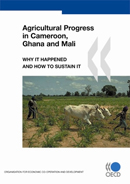Mali
Agricultural Progress in Cameroon, Ghana and Mali: Why it Happened and How to Sustain it
|
|
Agricultural Progress in Cameroon, Ghana and Mali: Why it Happened and How to Sustain it finds that agricultural progress in Cameroon, Ghana and Mali defies the often grim assessments of agriculture in the Sub-Saharan region. Since the mid-1980s food crop production in each of the three has more than kept up with population growth fuelling significant increases in per capita food availability.
Ghana's cocoa exports have quadrupled; Mali's cotton exports tripled and Cameroon's cocoa and cotton production have grown significantly. Moreover, while rural poverty remains a huge problem in all three countries, both the proportion and the number of rural people living in poverty have declined since the early 1990s. |
Multiple factors were identified in the study as possible contributors to improved agriculture performance. Growing per capita incomes boosted domestic demand and prices paid for food crops and livestock and generally positive trends in world export prices of cocoa and cotton helped. Perhaps most importantly however, in all three countries recovery in agriculture coincided with major re-orientations of macroeconomic and agricultural sector policy.
The study finds that these reforms sharply reduced the anti-agricultural biases that existed before and recommends that where there are vestiges of those former biases, as is the case for cotton in Mali and, though less so, for cocoa in Ghana, they should be eliminated.
The report also recommends increasing the relatively small amounts of public monies used to fund provision of agricultural research, extension and infrastructure – public expenditures known to yield high social returns. A related challenge, evident when looking at the process for planning and implementation of agricultural programmes and projects in the three study countries, is how to better allocate, monitor and measure the impact of aid flows - especially at the time when the development agenda regains interest in promoting agriculture. Meeting those needs will require substantial enhancements to the existing statistical support systems and analytical capacity in these countries.
Note: This study is available as an E-book in PDF format
Readers can also access the full version of Agricultural Progress in Cameroon, Ghana and Mali: Why it Happened and How to Sustain it, choosing from the following options:
* Via SouceOECD, our online library
* Via our Online Bookshop
Related Documents
